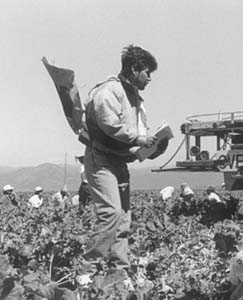Cultivating Solidarity
File photograph by David Bacon
Grad students, farm workers and maids find common cause
By Eric Johnson
LAST SUMMER, A FLIER WAS CIRCULATED in Watsonville strawberry fields designed to warn field workers against joining the United Farm Workers Union. It depicts the eagle of the UFW logo as a vulture in a dead tree in a graveyard. Surrounding the tree are headstones bearing the names of failed produce companies and the numbers of workers they employed. A cartoon thought-balloon above the UFW-vulture's head says in Spanish, "What a shame they broke down before the last drop of blood (la ultima gota de sangre) could be swallowed."
UFW organizer Alma Hernandez faxed me a copy of the flier, along with depositions from workers sympathetic to the union that described intimidation by company bosses. But what did the union expect, I asked, that the growers would look the other way when the UFW showed up in their fields?
Hernandez explained that growers must be careful not to violate the Agricultural Labor Relations Act, which gives workers the right to organize and bans "captive audience meetings," where workers are required to listen to anti-union speeches from the people who sign their checks.
Then, what about the growers' demand, heard repeatedly during the UFW's two-year-long strawberry campaign, that the UFW should just call an election to determine whether local pickers want the union or not?
"Until we get neutrality agreements, an election would be meaningless," Hernandez said. "The growers have power over these workers' lives. A free and fair election can't take place unless the growers agree to that."
Local UFW organizers are waging a campaign to get such a neutrality agreement from Driscoll, the biggest strawberry label in the country, which is owned by a group of Watsonville growers. Although the UFW has been successful in recent lawsuits with the growers, the more significant fight may be the one that takes place in public.
On June 24 at 4:30pm, representatives from two unions with similar interests to the UFW will hold a forum at UFW's Watsonville headquarters to talk about their organizations and their struggles to organize. Along with the UFW, a rep from the Hotel Employees and Restaurant Employees union (HERE) will describe efforts to organize the workers at the Asilomar Conference Center in Pacific Grove. Nationwide, HERE has been winning contracts and benefits in recent years for low-paid workers in the service economy.
Rounding out the forum Wednesday will be representatives from the UC--Santa Cruz chapter of the Academic Student Employees union, graduate student teaching assistants who have been trying to win recognition from the University of California for 12 years. Like the UFW and HERE, ASE has struggled to be recognized in a fight to organize a group of long- abused, low-paid workers.
The university claims that the students--who teach classes and grade papers just like "real" professors-- are not employees. But last week, the State Labor Board decided that ASE members at UC--San Diego are employees with collective bargaining rights.
That was a blow to the UC system, which has spent $1.8 million on the fight.
Leah Mundell, UCSC's ASE rep, points out that it would be impossible for the university to function without the TAs. We may get to find out soon enough--earlier this month, 87 percent of the TAs and tutors in the UC system voted to strike in the fall if the university continues to refuse to recognize them.
Mundell says the ASE members who have rotated through the union over the past 10 years are acting out of a commitment to education as much as self-interest. "When we are forced to take on sections with 80 students, that's no good for anybody," she says. "We want a contract that allows us to do a good job."
Organizing workers as different as janitors, field workers and graduate students may strike the casual observer as an odd combination, but such unions may represent the wave of the future for organized labor. In a sense, they hark back to labor's glory days, when the lowest-paid workers fought for respect and higher pay. They represent a revitalization of organizing and breathe new life into the spirit of collective bargaining, and for that we should all be thankful.
Copyright © Metro Publishing Inc. Maintained by Boulevards New Media.
![]()
 UFW farm workers in the field.
UFW farm workers in the field.
From the June 25-July 1, 1998 issue of Metro Santa Cruz.
![[MetroActive News&Issues]](/gifs/news468.gif)